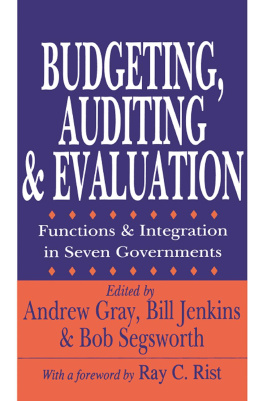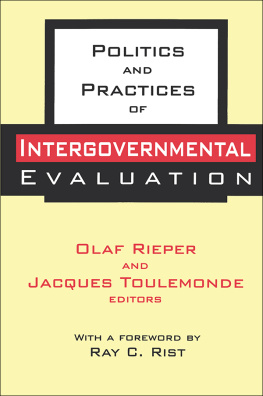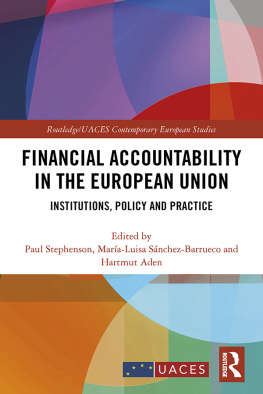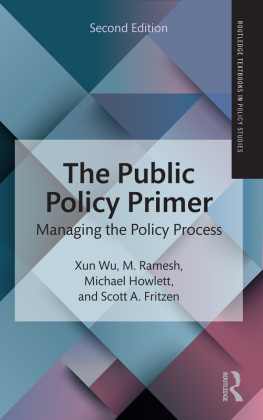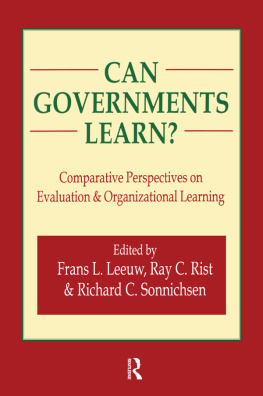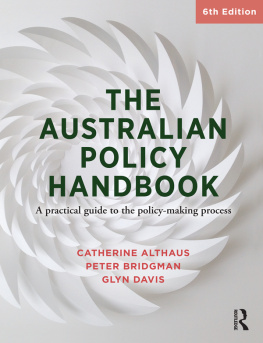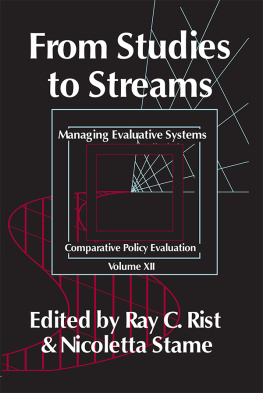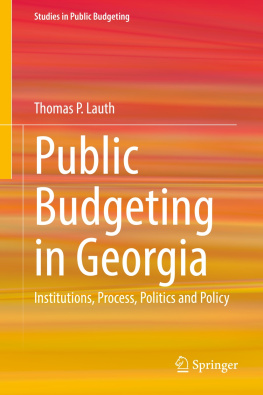BUDGETING, AUDITING, AND EVALUATION
Comparative Policy Analysis Series
Ray C. Rist, series editor
Program Evaluation and the Management of Government
edited by Ray C. Rist
Budgeting, Auditing, and Evaluation
edited by Andrew Gray, Bill Jenkins, and Bob Segsworth
Can Governments Learn?
edited by Frans L. Leeuw, Ray C. Rist, and Richard C. Sonnichsen
Politics and Practices of Intergovernmental Evaluation
edited by Olaf Rieper and Jacques Toulemonde
Monitoring Performance in the Public Sector
edited by John Mayne and Eduardo Zapico-Goni
Public Policy and Program Evaluation
by Evert Vedung
Carrots, Sticks, and Sermons: Policy Instruments and Their Evaluation
edited by Marie-Louise Bemelmans-Videc,
Ray C. Rist, and Evert Vedung
Building Effective Evaluation Capacity
edited by Richard Boyle and Donald Lemaire
BUDGETING, AUDITING, AND EVALUATION
Functions and Integration in Seven Governments
Edited by
Andrew Gray
Bill Jenkins
Bob Segsworth
With a foreword by
Ray C. Rist
First published 1993 by Transaction Publishers
First paperback edition 2002
Published 2019 by Routledge
2 Park Square, Milton Park, Abingdon, Oxon, OX14 4RN
52 Vanderbilt Avenue, New York, NY 10017
Routledge is an imprint of the Taylor & Francis Group, an informa business
Copyright 1993 by Taylor & Francis.
All rights reserved. No part of this book may be reprinted or reproduced or utilised in any form or by any electronic, mechanical, or other means, now known or hereafter invented, including photocopying and recording, or in any information storage or retrieval system, without permission in writing from the publishers.
Notice:
Product or corporate names may be trademarks or registered trademarks, and are used only for identification and explanation without intent to infringe.
Library of Congress Catalog Number: 92-14731
Library of Congress Cataloging-in-Publication Data
Budgeting, auditing, and evaluation : functions and integration in seven governments / edited by Andrew Gray, Bill Jenkins, Bob Segsworth
p. cm.
Includes bibliographical references and index.
ISBN 1-56000-071-6 (cloth); 0-7658-0724-6 (paper)
1. Budget. 2. Finance, PublicAuditing. I. Gray, Andrew. II. Jenkins, Bill. III. Segsworth, Bob.
HJ2043 .B92 1992
Publishers note: All chapters have been edited to conform to standard American spelling.
ISBN 13: 978-0-7658-0724-3 (pbk)
Contents
Ray C. Rist
Andrew Gray, Bill Jenkins, and Bob Segsworth
David Mathiasen
Andrew Gray and Bill Jenkins
Hans-Ulrich Derlien
Bob Segsworth
Eduardo Zapico Goi
Rolf Sandahl
Pertti Ahonen and Esa Tammelin
Andrew Gray and Bill Jenkins
There happens, in instances that are few and far between, that the publication of a book defines a field, establishes the intellectual framework for further discussion, and brings together in a coherent picture that which heretofore has been blurred. Such is my reaction to the present volume. What we are presented with here is a thorough set of studies on the relation of budgeting, auditing and evaluation that now allow us to see the international contour in a way that we previously have been unable to do. Seven country-specific analyses are juxtaposed and the comparisons and contrasts come into sharp relief. It is to the credit of the authors that they have written with detail and clarity that provides straightforward and unambiguous descriptions of the relations of budgeting, auditing, and evaluation in each country. The individual country portraits are painted with care.
To ask the question on the relation among these three functions of government is to address a new and intriguing problem. There is no tradition in any of the seven countries to presume that the integration of these functions is to be taken for granted, or even pursued. One of the strongest messages to come from the papers is that the autonomy of these functions is both historical in nature and institutional in form. Yet it is also clear that the nature of governmental responsibilities are changing and that the status quo will no longer hold. Thus, these three key functions of central government, budgeting, auditing and evaluation, are finding themselves being pushed closer and closer together. The marriage may be arranged, and the partners may not be enamored of one another, but the societal and institutional pressures to make it work are strong. Indeed, divorce does not even seem to be an option; the pressures are building on governments to constrain public spending more effectively, manage public resources better, select the appropriate policy tools, and then implement successfully. As a result, the question is not whether to integrate these functions of government, but rather, how.
It has to be said immediately and in defense of the authors that this volume does not seek to answer the how question. Rather, it addresses the antecedent question of what now exists and how the present conditions have come to be. Their contribution, and it is no small one, is to describe what forces have shaped the present institutional arrangements in the seven countries. It is from this perspective, then, that we are able to assess the distance yet to be traveled in each country toward more integration of these functions, assuming in each instance it is important to do so. The how question is framed by Gray and Jenkins in the concluding chapter where they ask, once the horse had been led to water, how do you get it to drink. These two authors thus begin the discussion on the question of the feasibility of integration and what political and institutional forces are at work to both encourage and inhibit such movement.
The authors in this volume are not on a bandwagon of governmental integration for its own sake. They have no ideological agenda here to push governmental restructuring because of any a priori assumptions. Rather, they seem especially attuned to the historical and legal precedents for the present set of arrangements. Stated differently, the present arrangements are not seen as deficits to be corrected. Indeed, there is clear sensitivity to the structural realities that have generated current separations and even conflicts. Each of the seven countries discussed here is Western in its value systems and democratic in its forms of political expression. That Spain is a recent addition on the latter point only adds to the interest in including it here. Thus it is to expected that in the pursuit of democratic systems of governing, there would be both hesitation and suspicion in creating central governments of too much power and too much rationalization. There is, as it were, an implicit assumption among the citizens of democratic societies that the preservation of liberty and freedom necessitates some checks and balances on central governments. In each of the cases presented here such constraints exist and are not lightly dismissed.
The strength of the papers comes in the recognition of this tension between the need for structural change to respond to the political and economic forces that are sweeping the globe and the particular historical and institutional arrangements in each of our respective societies. The argument for bringing more closely together the functions of budgeting, auditing and evaluation is thus made both on the grounds of enhancing governmental responsiveness within the context of both domestic and international pressures and in the context of stressing greater accountability of present efforts to be both economically competitive and more prudent stewards of public resources. Indeed, one can argue that the pressure to consolidate and integrate these functions comes from a growing concern about perceived weaknesses in the present institutional arrangements, not from perceived strengths that need to be checked through more stringent oversight.

